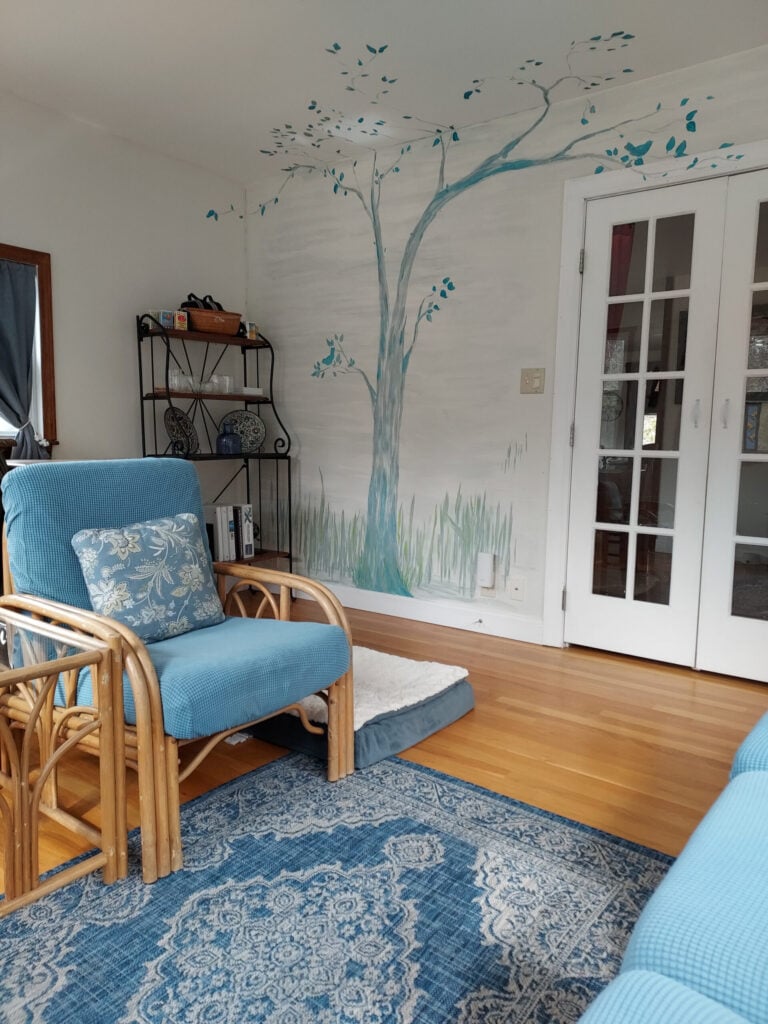After spending time and energy on a couples therapy retreat, many partners wonder how to keep the positive changes going at home. This guide provides practical, proven steps to maintain your relationship progress and build on what you learned during your intensive therapy experience. Whether you’ve just returned from a retreat or are looking to strengthen your relationship, these simple strategies will help you create lasting positive changes in your partnership.
Bringing Therapy Home
Change takes time, and it’s normal to slip back into old habits when you first get home. The key is noticing when this happens. When you or your partner point out an old pattern, you’re already making progress by being aware. Your online follow-up course will help you practice the exercises you learned, but the real work happens in your daily life together.
Creating Your Special Space
Turn a corner of your home into your own mini retreat center. Pick a quiet spot – it could be your bedroom, den, or even two comfortable chairs in the living room. This becomes your special place to talk, share, and connect. Try to spend time there every day, even if it’s just fifteen minutes to share your day over a cup of tea. This space is for both good times and tough conversations, but aim for five positive moments for every difficult one.
Making Time for Connection
Don’t let your time together become routine. Plan special moments that help you feel close. This could be as simple as giving each other a shoulder massage or as memorable as a weekend getaway. The important part is focusing completely on each other during these times. Put away your phones, look into each other’s eyes, and really be present.
Taking Care of Your Mental Health
A strong relationship starts with taking care of yourself. If you’re dealing with anxiety, depression, or past trauma, it’s vital to get the help you need. Don’t expect your relationship to fix these challenges; work on them together. Support each other in getting professional help when needed.
Couples in a good marriage expect their partners to stretch to be their best selves. It’s okay to encourage a reluctant spouse to get the mental health services that they need. Don’t settle for excuses like:
- I can’t find anyone.
- I don’t know where to look.
- I’ve lived with it this long; why change? or
- I’m too anxious (…depressed, traumatized) to get any help from that.
See these things for what they are: excuses.
Remember that taking care of your mental health is an act of love for both yourself and your partner.
Building Your Emotional Bank Account
Think of your relationship like a bank account – you need to make regular deposits of care and appreciation. Remember that what makes your partner feel loved might be different from what works for you. Take time to learn about their interests and what matters to them. Small gestures often mean the most – a sincere thank you, a loving text, or remembering something they mentioned earlier. Recognize that your marriage has an “on-off” switch, not a dimmer switch. Your actions are working to keep that light shining or welcome in the darkness.
Staying Honest and Open
Keep your relationship strong by being completely honest with each other. Even small dishonesty can harm trust over time. Set aside an hour each week to check in about how you’re both feeling. If something is bothering you enough to think about it repeatedly, it’s worth talking about. Share your thoughts with kindness and care.
To keep the “poop out of the pipes,” discuss resentments, complaints, or withholdings in your “private home retreat.” Do a “state of the union” assessment for an hour each week, and have a frank conversation. If the issue is worth thinking about or ruminating about, it’s worth talking about.
Simple Steps for Daily Progress
Talk to your partner the same way you’d talk to a good friend – with respect and care. When something upsets you, get curious instead of angry. Ask yourself what’s really bothering you and share that with your partner calmly. Notice and thank your partner for the good things they do, no matter how small. Set clear goals together about what you want in your relationship, whether it’s more quality time or better communication.
- Avoid Criticism. During couples therapy, you learn ways to communicate your feelings without criticism or blame and to ask your partner for feedback. Talk to them as you would someone you care about.
- Triggers don’t control you. Learn to control triggers. Set goals for yourself that focus on understanding triggers and vulnerabilities that influence the progress of your relationship. Be curious when an issue arises rather than getting angry.
- Focus on growth. In couples therapy, we focused on developing as a couple. It is essential to focus on your own growth, as well. Be resilient and flexible when being asked to make changes.
- Find the Positive. Offer your partner sincere praise. Acknowledge their efforts and tell them about moments when you feel hopeful and positive. Gratitude is incredibly powerful in making changes. Make that vocal by saying: “Thanks for making this a great day!” Make sure to pay attention to the small things with thoughtfulness and kindness.
- Set clear, specific objectives. Discuss what you need from each other in the future, such as more time together or more time alone. Think about what kind of partner you want to be. Constantly work towards your goals in couples therapy, one step and one interaction at a time.
Conclusion
Making lasting changes in your relationship takes dedication, but the rewards are worth the effort. By creating a special space at home for connection, staying honest with each other, and making regular deposits in your emotional bank account, you can keep growing stronger as a couple. Remember that every small positive interaction counts – from saying “thank you” to spending quality time together. Your relationship deserves this ongoing care and attention. With these practical tools and a commitment to growth, you can maintain the momentum and continue building a deeper, more fulfilling partnership.







